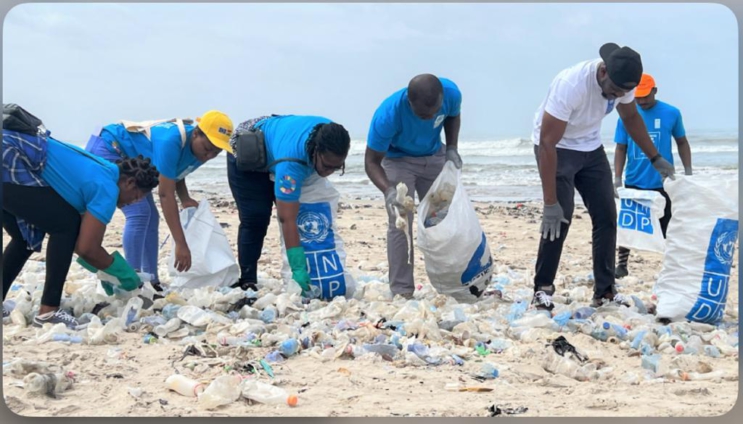Ghana as member of the Africa group of countries serving on the Intergovernmental Negotiating Committee is “strongly” pushing for the adoption an international legally binding instrument on plastic pollution.
Various Reports indicate 350 million metric tons of waste is generate on an annual basis by countries all over the world.
This amount of the petrochemical garbage which is equivalent to over 10 million fully loaded garbage trucks is very often incinerated or sent to landfills, thus eventually polluting our air, land, and oceans.
However in a bid to find lasting solution to the plastics crisis which is wreaking havoc to aquatic lives, over 140 countries have committed to adopt an international legally binding instrument on plastic pollution at a scheduled summit which will take place from 13 to 19 November 2023 at the United Nations Environment Programme (UNEP) Headquarters in Nairobi, Kenya.
The move will aim at cutting significantly the continuous production of these products and also tackling the controversial issue of a possible ‘polluter pays’ mechanism.

Margaret Spring, Chief Conservation and Science Officer at Monterey Bay- The world’s largest aquarium and conservation center, a bay of the Pacific Ocean located on the coast of the U.S. state of California, south of San Francisco in the United States of America told journalists at briefing ahead of the summit that “plastic waste cycle starts with the production of plastics which is oil and gas and fossil fuels;98-99% fossil fuel, so this is at its roots connected deeply to climate change”.
According to the conservation expert, it will be in the interest of all countries to adopt the international framework which will get all actors on board to deal with the imminent threats to aquatic life and global climate and food security at large.
The scientist pointed out to research dating back to 2016 which showed that countries such as the United States generate on the average 290 pounds of plastic waste.
This she described as a challenge for the Western Country while pointing to other trends of plastic pollution in other parts of the world which poses potential dangers to the environment.
Already some countries which are alarmed at the turn of events have pledged to tackle the plastic crisis by forming a high ambition coalition of 58 nations which aim ending plastic pollution by 2040.
Ghana which is also having its fair share of the challenge; having its beaches riddled with significant amounts of plastic waste has joined the Africa group of Nations which have pledged to review a draft international legally binding instrument on plastic pollution likely to be outdoored in October ahead of a crucial vote to adopt the framework at a summit scheduled take place from 13 to 19 November 2023 at the United Nations Environment Programme (UNEP) Headquarters in Nairobi, Kenya.
When asked at the briefing organised for Journalists at the Monterey Bay in California about her assessment on the posture of African countries towards the adoption of the proposed framework, Margaret Spring indicated that countries such as Ghana which are part of the Africa group are joining the negotiations and are “strongly” pushing for the reduction in the use of plastics which attempting to explore ways of getting polluters to pay for the cleaning of beaches and the waters.
Also present at the conservation briefing was Julie Packard, an America conservationist and chief executive of the World’s largest aquarium and conservation center who noted that the Monterey Bay Aquarium is deeply committed to making a difference on critical ocean conservation issues and continues to make big waves to protect the ocean — in California, nationally and around the world.
She added that the Aquarium’s coordinated science, policy and communications efforts focus on four key areas: Pacific Ocean wildlife and ecosystems, global fisheries and aquaculture, plastic pollution and climate change and ocean acidification.
Latest Stories
-
‘We have missed him for months’ – Arteta on Thomas Partey
8 mins -
Togo heads to polls amid tensions over law reform
10 mins -
Nigerians excited over Harry and Meghan’s planned visit
14 mins -
‘We are sorry but we need to stay calm’ – Andre Ayew on Black Stars recent form
31 mins -
Election 2024: Bawumia dares Mahama to two-man debate
37 mins -
Bawumia is a man of integrity and discipline unlike Mahama – Miracles Aboagye
42 mins -
Ejisu by-election: NDC is sponsoring Aduomi; don’t vote for him – Bawumia to NPP supporters
46 mins -
Freedom of speech must engender development
49 mins -
Ghana Hajj Board announces flight schedules for 2024 pilgrimage
55 mins -
T-bills: Interest rates increased for first time since January 1; government fails to meet target
2 hours -
Ghana retains 10th position with lowest fuel price in Africa
2 hours -
Mahama cuts sod for new Jakpa palace in Damongo
3 hours -
Will Ghana’s democracy stand the test of time in the 2024 elections?
6 hours -
Hindsight: Dreams fairytale run proved one thing; it is possible
7 hours -
God makes rulers, not you; you can’t choose your successor – Mahama to Akufo-Addo
8 hours

